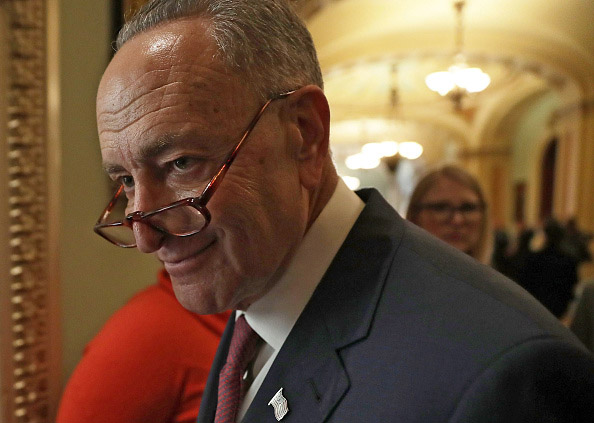HEADLINE NEWS
POLITICS
By Bonnie K. Goodman

WASHINGTON, DC – NOVEMBER 16: U.S. Sen. Charles Schumer (D-NY) leaves after an election meeting of Senate Democrats to elect new leadership at the Capitol November 16, 2016 in Washington, DC. Sen. Schumer was elected as the incoming Senate minority leader. (Photo by Alex Wong/Getty Images)
After the House Republicans had voted on their leadership posts, the Senate had their turn. On Wednesday morning, Nov. 16, 2016, as predicted Republican Sen. Mitch McConnell, (R-KY) was re-elected majority leader by acclamation, while New York Democrat Sen. Chuck Schumer was elevated to minority leader, as departing minority leader Sen. Harry Reid’s heir apparent. Vermont Sen. and 2016 Democratic candidate Bernie Sanders also grabbed his first Senate leader post as Chair of Outreach.
The Republicans retained their leaders in their election for the 115th Congress. In a meeting of the GOP conference on Wednesday morning, McConnell was re-elected “by acclimation by his colleagues with a standing ovation,” as his spokesman Don Stewart told the press. Sen. Marco Rubio (R- FL) nominated McConnell, while Sen.-elect Todd Young, (R-IN) second the motion, both were instrumental to the GOP maintaining their majority.
McConnell was expected to remain in his post, and there were no surprises in the GOP leadership votes. McConnell, 74 will be serving his second term as majority leader, previously he was minority leader for four terms, and is “Kentucky’s longest-serving senator;” he was first elected in 1984.
All the action was with the Democrats after they shook up their leadership with the retirement of longtime leader Sen. Reid. Reid already named Schumer, his successor, but Wednesday’s vote made that a reality. After the being elected Schumer expressed, “I am going to wake up every single day focused on how Senate Democrats can effectively fight for America’s middle class and those struggling to join it.” While Schumer told reporters, “We are ready to go toe to toe with Republicans.” Although the minority leader acknowledged, “When you lose an election like this, you can’t flinch. You can’t ignore it. You need to look it right in the eye and ask why, analyze it and learn from it.”
Schumer, 66 has served in the Senate since 1998, and he was in the House representing Brooklyn and Queens for 18 years before that. In 2006, Reid tapped Schumer to be the party’s number three in the Senate as vice chairman of the Democratic Conference, a position her served for ten years. When Reid announced his retirement in 2015, he made it clear he wanted Schumer to succeed him as Senate Democratic leader.
Overshadowing Schumer’s election was the addition of Sanders to the enlarged leadership team. The popular Sanders will be the outreach chairman, a newly created post within the ranks. Senate Democrats were pressured to add the formerly independent Senator to their leadership ranks after his historic run for the Democratic nomination, with a still very loyal supporter base.
After his appointment, Sanders spoke to reporters, telling them he has a “heavy responsibility to help shape the priorities of the United States government. I’m going to do everything that I can to make sure that the budget that leaves the United States Congress is a budget that represents the needs of working families and a shrinking middle class and not billionaires.” Sanders will also retain his post as the senior minority member of the Budget Committee.
Otherwise, in the Democratic ranks, Sen. Dick Durbin, (D-Ill) remains minority whip. Sen. Patty Murray (D-WA) will be the new assistant Democratic leader, and Sen. Debbie Stabenow (D-MI) moves up to chair the Democratic Policy and Communications Center. Sen. Tammy Baldwin, (D-WI) becomes Democratic Conference secretary, the fourth ranking in leadership, and Joe Manchin (D-WV) takes over as vice chair of the Democratic Policy and Communications Committee.
The Democrats enlarged their team from seven to 10 posts. Sens. Elizabeth Warren (D-MA) and Mark Warner (D-VA) now moved up to newly titled posts of vice chairs of the Senate Democratic Conference. Sen. Amy Klobuchar’s (D-MN) position title changed from chairwoman of the Democratic Steering and Outreach Committee to just chair of the Steering Committee.
Additionally, Sen. Dianne Feinstein, (D-CA ) becomes the ranking member of the Judiciary Committee, while longtime-Judiciary member Patrick Leahy (D-VT) moves to the Appropriations Committee.



